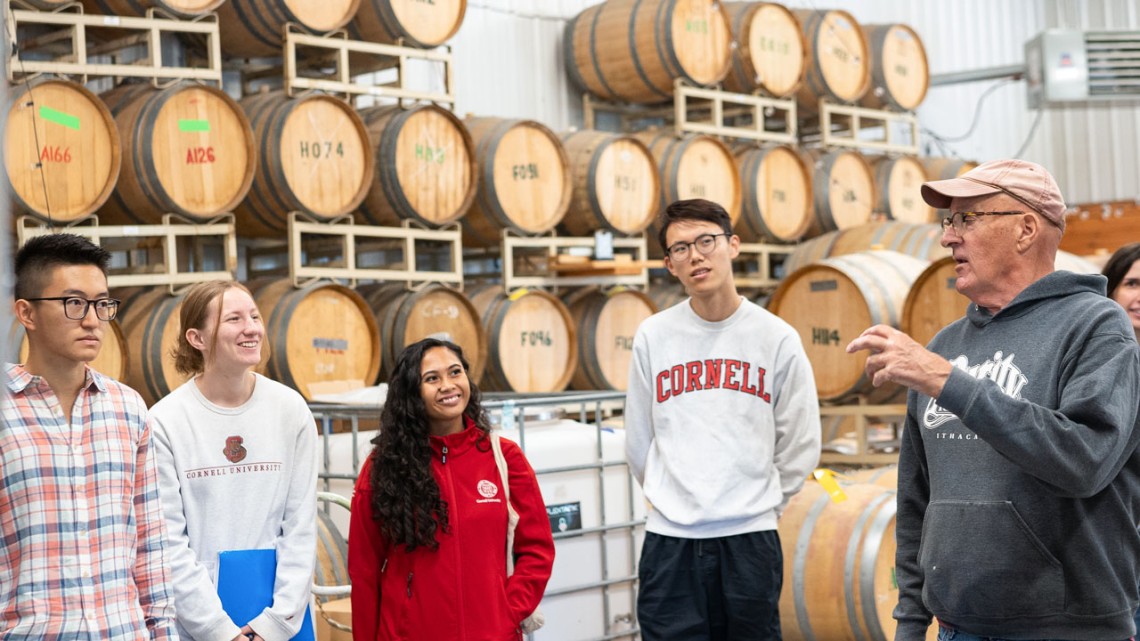
Dyson students, from left, Bill Tong, Sam Groark, Harmony Prado, and Kerwin Xu learn about the bottling process from Pete Saltonstall, co-owner of Treleaven Wines.
Students hope to help NYS wine industry reuse bottles
By Alison Fromme
Three student teams are working on a solution to a significant sustainability problem facing New York state’s wine industry: how to reuse the bottles.
The undergraduates at the Cornell SC Johnson College of Business are investigating the potential for a startup wine bottle washing and reuse facility.
Kerwin Xu ’24 and his classmates are approaching the challenge with “design thinking,” a stepwise approach to problem-solving, and they are following specific customer discovery strategies. They have interviewed redemption centers, wine consumers, winery owners and restaurants to look for roadblocks and partnership opportunities.
And they recently met with Peter Saltonstall, co-owner of Treleaven Wines in King Ferry, New York, and the primary client for this project.
“Our main goal is to figure out the feasibility – for Treleaven Wines and all New York state wineries – to implement infrastructure for wine bottle washing, including procedures, finances and operations,” said Xu, a student at the Charles H. Dyson School of Applied Economics and Management in visiting professor Brad Treat’s Grand Challenges class.
Visiting Treleaven, the students got a closeup look at grape crushing equipment, wine casks, the bottling line and storage space.
“Seeing all of the production processes on site was very exciting,” said Xu, who noticed that a large portion of the facility is devoted to storing cases of wine. “I was shocked by how the balance of space used for different production processes was drastically different from what I thought.”
At the end of the semester, Treat’s students will pitch their ideas to Saltonstall and several other winery owners. The class is part of the multiyear Grand Challenges curriculum, which aligns with the United Nations Sustainable Development Goals.
“This is learning by doing,” said Treat. “The answers are not available on Google. There’s no cheat sheet. No AI engine can solve this challenge, and the potential outcomes are many.”
Treleaven Wines sells approximately 150,000 bottles annually; New York state wineries overall produce roughly 32.5 million gallons of wine.
Unlike aluminum cans and plastic bottles, there is no redemption program for wine bottles in New York state, and recycling is up to the individual. Even when bottles are recycled, glass must be crushed, melted and manufactured into a new product, which incurs environmental costs.
The catalyst for this engaged learning project is proposed New York state legislation that would require businesses to develop and implement strategies to promote recycling, reuse and recovery of their product packaging, if it is adopted. The bill, known as extended producer responsibility legislation, aims to integrate the environmental costs of a product into its market price. Several other states across the country have passed or are considering similar legislation.
Saltonstall says that he and other winery owners became concerned about how this legislation might affect his business and the entire state’s wine industry when it was first introduced about three years ago.
“We all need to do better [for the environment], whether or not the legislation passes,” said Saltonstall. “I thought, ‘Of all the bottles we generate, can they be reused?’”
The logistical challenges for a wine bottle washing and recycling facility are significant, Saltonstall said. Receiving thousands of empty bottles, removing their labels, sterilizing them, and ensuring customers will accept used bottles are all hurdles to overcome. Plus, a reused wine bottle would have to cost the same or less than a new bottle to be a viable solution for wineries.
“This is a project that’s beyond legislation,” said Xu. “It feels very entrepreneurial. We’re working with a huge problem, and we’re trying to scale this solution. Grand Challenges prepares us to face an actual client and then think about the implications on the world.”
Alison Fromme is a writer for the Cornell SC Johnson College of Business.
Media Contact
Get Cornell news delivered right to your inbox.
Subscribe

